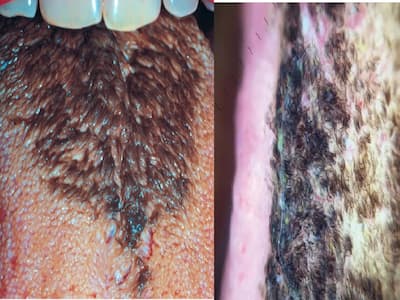Don’t Miss Out on the Latest Updates.
Subscribe to Our Newsletter Today!
Indian Man’s Tongue Turns Black And Hairy After Stroke: Doctors Explain The Cause

Black hairy tongue, known medically as lingua villosa nigra, is commonly seen in people who have difficulty eating or are on a pureed diet.
People who suffer a stroke may experience long-lasting effects, such as incontinence, speech/language problems, problems with swallowing or eating, weakness or paralysis. But, in a mysterious case, an Indian man's tongue turned black hairy after he suffered a stroke, according to a report in JAMA Dermatology.
Three months back, the man in his 50s had experienced a cerebrovascular incident with dense hemiplegia. He suffered paralysis of the left side of his body after the stroke, which made it difficult for him to eat. Since then, on doctors' recommendation, he was being fed a diet of pureed food and liquids. He was also taking oral antiplatelets and antihypertensives. After a few months, his tongue turned black and furry. Desperate for answers, he went to the Medical Trust Hospital in Cochin, Kerala, where dermatologists diagnosed him with "black hairy tongue", known medically as lingua villosa nigra.
Black hairy tongue after a stroke
Black hairy tongue or lingua villosa nigra occurs when the papillae, the tiny bumps on the surface of the tongue that create the strawberry like appearance, become clogged with bacteria. Papillae contain tastebuds and they shed, like the skin, in a process called desquamation. Usually, they stay around 1mm in length, but if the tongue is not cleaned - with food you eat or cleaning it with a toothbrush - the small nodules can keep growing and can even reach a length of 18mm. Then, bacteria and yeasts overgrow on the tongue and cause discoloration, leading to the appearance of hair-like structures, the doctors explained.
Also Read
Further the authors said that the overlong papillae appear to produce keratins, the same proteins found in hair, which contribute the familiar hairlike appearance. Overtime, the tongue can become black, white and yellow.
Describing the man's condition, the doctors' team at the Medical Trust Hospital in Cochin, Kerala, said, "The dorsal aspect of his tongue showed a thick black coating that was yellowish toward the medial and proximal parts. The lateral borders, tip, and central part of median sulcus were spared. Dermoscopy results showed thin, elongated, black fibers that gave the appearance of a hairy surface. Amorphous yellowish deposits were visible peripherally. Mucosal scrapings from the lingual surface grew normal bacterial flora on culture. No fungal growth was isolated. With these findings, a diagnosis of black hairy tongue (BHT) was made."
The yellowing was likely a result of trapped food scattered throughout the hairs, they said.
The patient and caregivers were advised to follow proper cleansing measures, and the discoloration resolved after 20 days, they added.
Causes of black hairy tongue
Iingua villosa nigra is not harmful, but it is unsightly. While the condition is linked to poor oral health, it can also be caused by smoking, drinking alcohol, cocaine use, coffee, dehydration and some medications, including antibiotics.
Black hairy tongue is commonly seen in people who have difficulty eating or are on a pureed diet. So, heath experts advise stroke survivors to focus on oral hygiene to reduce such complications.


